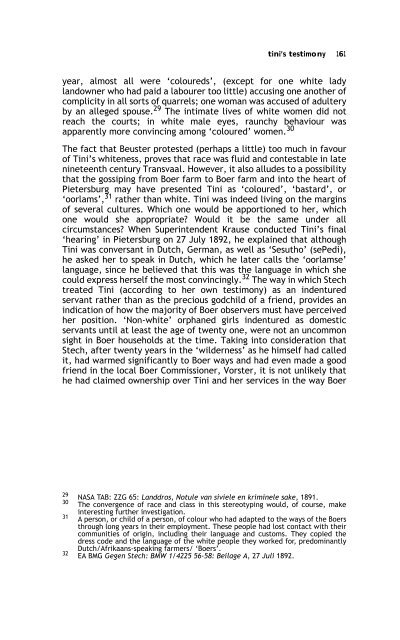Sex, Gender, Becoming - PULP
Sex, Gender, Becoming - PULP
Sex, Gender, Becoming - PULP
Create successful ePaper yourself
Turn your PDF publications into a flip-book with our unique Google optimized e-Paper software.
tini’s testimony 161<br />
year, almost all were ‘coloureds’, (except for one white lady<br />
landowner who had paid a labourer too little) accusing one another of<br />
complicity in all sorts of quarrels; one woman was accused of adultery<br />
by an alleged spouse. 29 The intimate lives of white women did not<br />
reach the courts; in white male eyes, raunchy behaviour was<br />
apparently more convincing among ‘coloured’ women. 30<br />
The fact that Beuster protested (perhaps a little) too much in favour<br />
of Tini’s whiteness, proves that race was fluid and contestable in late<br />
nineteenth century Transvaal. However, it also alludes to a possibility<br />
that the gossiping from Boer farm to Boer farm and into the heart of<br />
Pietersburg may have presented Tini as ‘coloured’, ‘bastard’, or<br />
‘oorlams’, 31 rather than white. Tini was indeed living on the margins<br />
of several cultures. Which one would be apportioned to her, which<br />
one would she appropriate? Would it be the same under all<br />
circumstances? When Superintendent Krause conducted Tini’s final<br />
‘hearing’ in Pietersburg on 27 July 1892, he explained that although<br />
Tini was conversant in Dutch, German, as well as ‘Sesutho’ (sePedi),<br />
he asked her to speak in Dutch, which he later calls the ‘oorlamse’<br />
language, since he believed that this was the language in which she<br />
could express herself the most convincingly. 32 The way in which Stech<br />
treated Tini (according to her own testimony) as an indentured<br />
servant rather than as the precious godchild of a friend, provides an<br />
indication of how the majority of Boer observers must have perceived<br />
her position. ‘Non-white’ orphaned girls indentured as domestic<br />
servants until at least the age of twenty one, were not an uncommon<br />
sight in Boer households at the time. Taking into consideration that<br />
Stech, after twenty years in the ‘wilderness’ as he himself had called<br />
it, had warmed significantly to Boer ways and had even made a good<br />
friend in the local Boer Commissioner, Vorster, it is not unlikely that<br />
he had claimed ownership over Tini and her services in the way Boer<br />
29 NASA TAB: ZZG 65: Landdros, Notule van siviele en kriminele sake, 1891.<br />
30<br />
The convergence of race and class in this stereotyping would, of course, make<br />
interesting further investigation.<br />
31 A person, or child of a person, of colour who had adapted to the ways of the Boers<br />
through long years in their employment. These people had lost contact with their<br />
communities of origin, including their language and customs. They copied the<br />
dress code and the language of the white people they worked for, predominantly<br />
Dutch/Afrikaans-speaking farmers/ ‘Boers’.<br />
32 EA BMG Gegen Stech: BMW 1/4225 56-58: Beilage A, 27 Juli 1892.
















